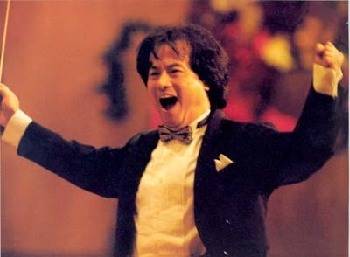| |
Currently, the liveliness of the domestic music arena has exerted impact on the Chinese musicians abroad. Some musicians who have made remarkable achievements in the international arena returned home to put on concerts, such as Fu Haijing, Dilibaier, and Kong Xiangdong. Their visibility in the world arena has been honor and pride for Chinese musicians. Furthermore, there are some young Chinese musicians in the world music arena. They are seeking harmony and transcendence between the oriental humanism and modern western composition techniques, and they have occupied their places in the world music arena with their matured music works. These composers include Tan Dun, Zhai Xiaosong, Zhou Long, Chen Yi, and Ye Xiaogang. They studied in the Department of Composition in CCOM from 1977 to 1982. Then they went to the U.S., writing songs as well as studying. Their works are often performed in concerts or win prizes in composition competitions. Among these composers, Tan Dun is the most successful one. He has won prizes in almost all the important international composition competitions. He is very productive in composition. The oriental Chu Culture is the soul of his music. No matter how he changes his music techniques, human vs. nature is always the theme that he explores. He composed “Jiu Ge”, an opera adapted from the poems of Qu Yuan, which was casted in Lincoln Art Center. Later he organized a band of overseas Chinese musicians, held solo concerts, and developed some new ceramic musical instruments. The incessant composition and experiments in performance modes have enabled him to be a true avant garde international composer. Currently, Tan Dun has become an important composer in the world. Some well-known music groups are inviting him to write new songs. His albums have been published by Germany and Japanese records companies. Some European bands are also inviting him to be the conductor of his own works.
 Ye Xiaogang
Ye Xiaogang
Some contemporary world-class composers have made such comments on the young Chinese composers: they are bringing about an oriental life and vigor to the world music arena. Although the engagement of serious music is also difficult in the west, Chinese musicians have established their own image in the world. Ye Xiaogang went to Eastman School of Music, a first-rate music school, to study composition in 1987. During his study, he began to receive invitations across the world, composed works on different themes, and took part in all kinds of international art activities, including dance opera, symphony and chamber music. His works have been performed in Canada, the U.S., Japan, Taiwan, New Zealand, the UK and Finland and received high media appraise. Since 1989, Ye Xiaogang has been included in International Who’s Who and International Who’s Who in Music published by Cambridge. In 1990, his “Threnody” won Louis Lane Prize from the Eastman School of Music; in 1991, his “Collapse of the Himalayas” won Howard Hanson Prize in the U.S.; in 1992, his “The Silence of Sakyamuni” won award in the first Taiwan Symphony Orchestra’s Composition Competition; in 1993, his “Horizon” was included in “20th Century Chinese Music Classics” by Chinese Culture Promotion Society. In 1994, Ye Xiaogang received Achievement Award from the U.S. LI Foundation for his efforts in exploring new forms of music and as an encouragement for him to be engaged in composition and research in mainland China. In early 1994, Ye Xiaogang decided to move back to China and teach in CCOM, his alma mater. What he was going to teach was new art concepts and composition techniques. The teaching content of CCOM has been continuously upgraded thanks to teachers like Ye Xiaogang, which is one of the achievements of the reform and opening-up. It has broadened the horizon and boosted the skills of teachers and students and provided multiple paths for the development of the Chinese music.
What is worth mentioning is that Zhang Yimou, a famous Chinese movie director, was invited for Italy to direct Turandot, a well-known opera, in 1997. He integrated Chinese opera, costumes and performance skills into the opera and enabled a new charm in the ancient opera. It was refreshing for the western audience and created a sensation in Italy.
V. The praise received by music groups performing abroad
Since the reform and opening-up, we have opened our door to the outside world. When foreign musicians came to the Chinese stages, our music groups are also going to the world to take part in international music activities or conduct visiting performances. The frequent music exchanges have enhanced the understanding of musicians from different countries between each other. The Chinese music groups have also won some reputation in the international music arena relying on their potential. In recent years, the influential visits of Chinese music groups are as follows:
The visit of China Youth Symphony Orchestra to six West European countries, the Soviet Union and three East European Countries. China Youth Symphony Orchestra mainly comprises young teachers and students from Orchestral Department of CCOM. Since 1980s, the proficiency of the band has been hugely improved under the guidance of famous conductors, such as Seiji Ozawa, Zipper, Chen Liangsheng, Chen Zuohuang, Tang Mohai and Shao En. In December 1986, 90 musicians from China Youth Symphony Orchestra visited six countries, namely, Switzerland, Italy, Federal Republic of Germany, France, Belgium and the UK, under the leadership of Tang Mohai and Shao En. The visit lasted for 50 days and 18 performances were put on, creating a sensation in Europe. China Youth Symphony Orchestra had conquered the European audiences with their perfect artistic skills and consuming passion. After the successful performance in West Europe, China Youth Symphony Orchestra received another performance invitation in less than a year: to visit Poland, GDP, and the Soviet Union. That trip lasted 48 days from Nov 4, 1987 to Dec 21. They visited 16 cities and put on 15 concerts. It was also a huge success. They were warmly received by local people everywhere they went.
|
|
